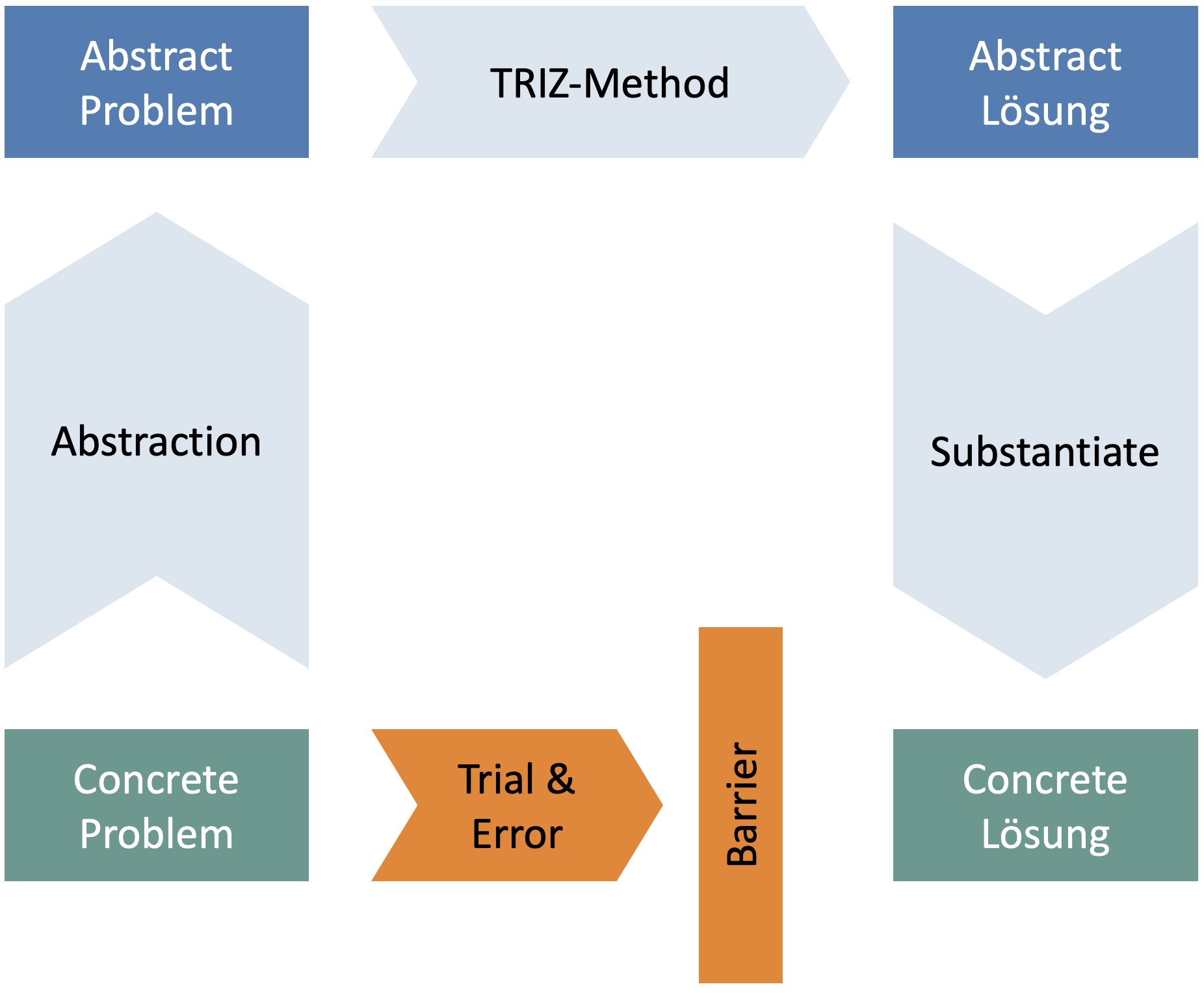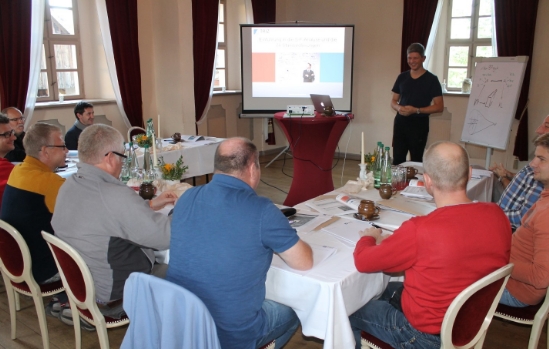TRIZ-Courses:
The innovation method for inventive problem solving
- Find systematic ways to solve problems with the innovation method.
- TRIZ supports you in structured analysis for engineering product development.
- This will give you more ideas in a short time than the classic brainstorming!
For a free initial consultation you can reach us at: +49 170 3588422

For branches
Process and production engineering
Software architectures
Electromechanics
Mechatronics
Mechanical engineering
Electronic engineering
The TRIZ origins
TRIZ is an acronym that originated in Russian. It stands for the theory of inventive problem solving. The methodology had its beginning in the middle of the 20th century. Genrich Altschuller, Rafael Shapiro and Dmitri Kabanov are counted as fathers of the idea.
Your competent TRIZ coach
- Co-inventor of 124 granted patents
- Lecturer for innovation methods
- first German-speaking TRIZ Master
- 20 years of experience with inventive problem solving

What is TRIZ all about?
Behind the TRIZ innovation method is a comprehensive toolbox of methods with different ways of approaching work. The problem-solving practices help you in particular with the analysis and subsequent solution of technical challenges. TRIZ originally emerged from mechanical engineering, but with minor adaptations it is just as suitable for use in other technical fields.

With TRIZ to methodical creativity
At TRIZ-Consulting, our experienced trainers support you within presence courses or e-learning to master different levels of the innovation method. In doing so, you will learn the different strategies of classic and modern TRIZ and train their practical implementation. In this way, you will bring systematic problem solving into your company.

The TRIZ goals

Systematic ideas
TRIZ supports you systematically in developing numerous ideas. In this way, you first find a general solution to a technical problem, which you then specify with the help of the extensive method toolbox and your own know-how.

Universal method
Inventive problem solving with TRIZ is not only applicable in mechanical engineering. You can also use it to create software-architectural, process-engineering, electro-mechanical, electronic and manufacturing concepts.

Find solutions quickly
The TRIZ method is particularly suitable in the concept phase of a product for the systematic development of numerous ideas. It also helps you and your company to solve acute technical problems that you tackle with the various tools.
Courses and trainings at a glance
Why TRIZ-Consulting

Competence
TRIZ-Consulting is backed by 20 years of concentrated competence in the field of inventive problem solving.

Learning material
We provide you with clearly structured learning material. This allows you to refresh your knowledge after the training or to read up on the practices and principles of the innovation method.

Software solutions
We recommend professional software solutions that we at TRIZ-Consulting use regularly ourselves. The tools support you sustainably in developing individual solutions.
FAQ about TRIZ
How did TRIZ come into existence?
Genrich Saulovich Altschuller, Rafael Borisovich Shapiro and Dmitri Dmitrijevish Kabanov are considered to be the main creators of the TRIZ method. Thus, it was officially established in 1954-1956, but the researches started probably already some years before.
What methodology is TRIZ based on?
TRIZ is based on the assumption that general principles can be derived from existing patents and descriptions of technical breakthroughs. The goal was to discover a kind of law of invention. In 1956, Altschuller and Shapiro found three important patterns for this:
- Many inventions are the result of a relatively limited number of solution principles.
- Innovative developments can only be realized if contradictions are overcome.
- How technical systems develop follows certain laws.
With these thoughts and numerous methodical tools, users succeed in systematizing, concretizing and finally abstracting engineering problems.
What does MATRIZ stand for?
MATRIZ is an acronym for a Russian term. The abbreviation stands for the International Association for TRIZ. This is the umbrella organization of TRIZ. Its members include all TRIZ associations. The goal is to provide standardized training in the innovation method for inventive problem solving.
.In September 2022, the international conference elected a board of MATRIZ that most TRIZ masters could not get behind. Therefore, these TRIZ Masters withdrew from the original MATRIZ and founded the MATRIZ Official. Thus, there are now two international TRIZ associations.
.
Which analyses and tools are part of classical TRIZ?
Classical TRIZ uses the original method set of Altschuller. He incorporated all his findings into it. It is based on patent analysis and focuses primarily on idea creation. The following practices are used in the approach:
.- System Operator
- Operator STC
- Engineering Contradiction
- Contradiction Table
- Physical Contradiction
- Small Smart People
- Substance-Field Analysis
- Trends of Engineering System Evolution
- ARIZ – Algorithm of inventive problem solving
- 40 Inventive Principles
- 4 Separation Principles
- 76 Standard Inventive Solutions
How does the modern TRIZ method differ from the classical?
Modern TRIZ extends the classical approach by new methods. Among the most well-known applications are:
- Function Analysis for Products and Processes
- Trimming
- Effect data base application
- Feature Transfer
- Cause and Effect Chains Analysis
- Flow Analysis
- Trends of Engineering System Evolution – Extended
How does the contradiction matrix work?
The contradiction matrix is one of the main tools of the TRIZ innovation method. It enables users to derive innovation principles from a technical problem to be solved by means of contradiction. The classical matrix contains the same preset 39 parameters in the first column as well as in the first row, which describe the contradiction abstractly. The order is essential here. The contradiction consists of the fact that, in the technology to be developed or enhanced, one technical parameter improves while another deteriorates at the same time. With the identification of the abstract contradiction it is possible to identify inventive principles from the matrix that have in the past often solved this contradiction.








